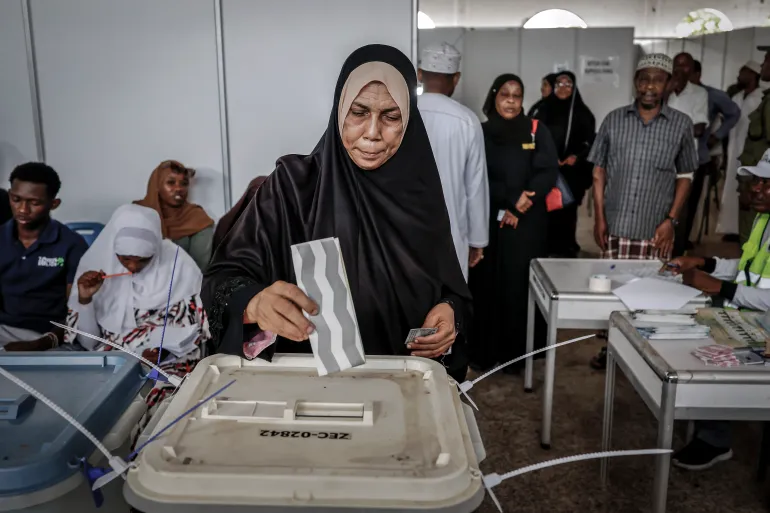
Tanzania heads to the polls in a highly tense national election marked by protests, internet disruptions, and the exclusion of key opposition candidates. With President Samia Suluhu Hassan expected to secure a second term, critics have denounced the vote as neither free nor fair, citing a government clampdown on dissent and widespread human rights violations.
Millions Vote as Opposition Barred From Race
More than 37 million registered Tanzanian voters began casting ballots on Wednesday, October 29, 2025, in presidential and parliamentary elections across the mainland and the semiautonomous Zanzibar archipelago. Polls opened at 7am (4:00 GMT) and are set to close at 4pm (13:00 GMT), with official results expected within three days.
However, the absence of Tanzania’s two major opposition parties has cast a long shadow over the process. The Chadema Party, led by Tundu Lissu, was disqualified in April after refusing to sign an electoral code of conduct. Lissu himself is currently on trial for treason, charges he strongly denies. The ACT-Wazalendo party’s candidate, Luhaga Mpina, was also barred after objections from the attorney general, leaving only minor party contenders to face Hassan.
Protests and Violence Erupt in Dar-es-Salaam
Despite heavy police presence in Dar-es-Salaam, hundreds of protesters took to the streets chanting “We want our country back!” in defiance of government restrictions. Clashes erupted near Nelson Mandela Road, where demonstrators reportedly burned down a police station. Security forces fired tear gas and rubber bullets, but were forced to retreat after being pelted with stones, according to local media and AFP.
District Commissioner Alfred Chalamila declared that the government would not tolerate “disruptors of peace,” announcing a 6pm curfew in the capital. Internet connectivity across the country was also severely disrupted, with advocacy group NetBlocks confirming a nationwide blackout during voting hours.
Hassan Expected to Win Despite Growing Criticism
At 65, President Samia Suluhu Hassan—the only woman head of state in East Africa—is expected to win comfortably, given the absence of credible challengers. Hassan’s Chama Cha Mapinduzi (CCM) party, in power since Tanzania’s independence movement in the 1950s, remains the country’s dominant political force.
When Hassan took office in 2021 following the death of former President John Magufuli, she was praised internationally for easing restrictions on the press, lifting bans on opposition rallies, and pledging political reforms. However, rights groups now accuse her administration of reverting to authoritarian tactics reminiscent of the Magufuli era.
Crackdown on Opposition and Human Rights Concerns
Opposition leaders, journalists, and activists have increasingly reported arbitrary arrests, abductions, and extrajudicial killings. The Tanganyika Law Society says it has verified at least 83 abductions since Hassan assumed power, with another 20 reported in recent weeks.
In one case that shocked the nation, Ali Mohamed Kibao, a senior Chadema official, was abducted in September 2024 and later found dead after being dragged off a bus by armed men. Even members of the ruling CCM have allegedly been targeted—Humphrey Polepole, a former CCM spokesperson and ambassador to Cuba, disappeared earlier this month after criticizing Hassan’s leadership. His family discovered blood stains in his home.
International Human Rights Bodies Raise Alarms
The United Nations Human Rights Council has urged Tanzania to end the “enforced disappearance of political opponents” and halt the intimidation of civil society groups. Amnesty International recently released a report describing a “wave of terror” marked by torture, arbitrary detention, and killings of opposition figures. Human Rights Watch echoed those concerns, saying the electoral commission lacks independence and that the political space in Tanzania has shrunk dramatically.
The US-based ACLED crisis-monitoring group warned that Tanzania’s ruling party appears determined to remain the “last hegemonic liberation party in southern Africa,” resisting democratic pressures seen in South Africa, Namibia, and Zimbabwe.
Economy and Campaign Promises
While the political atmosphere remains tense, Tanzania’s economy continues to grow at a steady pace. The World Bank estimates a 5.5 percent growth rate in 2024, driven by agriculture, tourism, and mining. Hassan has promised to expand infrastructure projects, introduce universal health insurance, and promote foreign investment to sustain economic stability.
Yet, critics argue that economic progress has come at the expense of democratic freedoms. Analysts say voter turnout—particularly among the youth—appears significantly lower than in past elections, reflecting growing frustration with the political system.
Outlook: Tanzania’s Democratic Future in Question
As polls close and results await announcement, many Tanzanians remain skeptical about whether this election marks progress or decline. With major opposition figures silenced and civil liberties curtailed, the 2025 elections could define the trajectory of Tanzania’s democracy for years to come.
Despite government assurances of a fair vote, the combination of internet blackouts, curfews, and opposition bans paints a troubling picture of political repression in one of East Africa’s most influential nations.


Leave a Reply